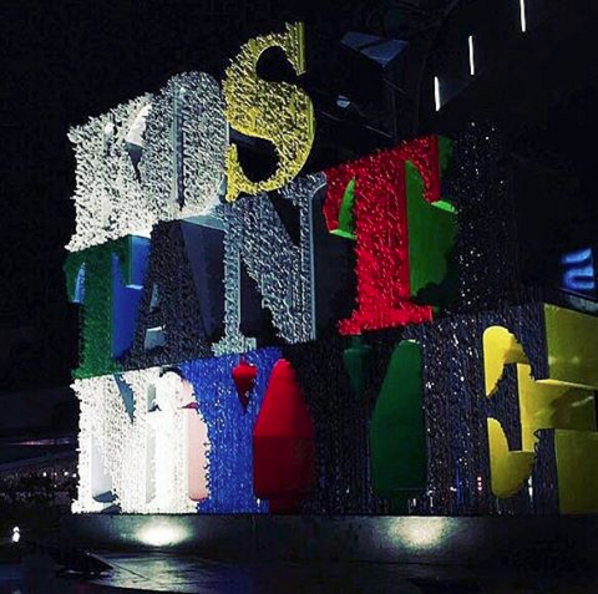
A sculpture by Ahmet Güneştekin was removed from public display last week, just hours after its installation, after being met with protests at the scene and on social media, the Kurdish news network Rudaw reported on Tuesday.
Kostantiniyye (2015) went on display outside the A Plus shopping mall in the Western part of the city, just outside the Atatürk airport, on Thursday, December 22. According to an Instagram post by the artist, a “big crowd” gathered within five hours of the sculpture’s unveiling to protest the sculpture, a Robert Indiana-style word sculpture of the word “Kostantiniyye,” an old name for the city of Istanbul. By midnight, city officials had covered it in black plastic wrap, and it was removed entirely on Saturday, December 24.
“It is very tragicomic when people are blaming you for not respecting the history, while they do not have any idea how rich our history has been,” the artist told Rudaw in a televised interview on Sunday.
Istanbul has been known by many names, from Byzantium in the 600s BC to Istanbul in the present day. As the capital of the Roman Empire under Constantine the Great, it was christened Constantinople, which it was called throughout Ottoman rule, at least in the west. Kostantiniyye is a Turkish-language version of the Greek name. It wasn’t until the 1930s that Istanbul became the widely-accepted moniker.
Güneştekin is Kurdish, and was born in a workers’ camp in the city of Batman, Turkey in 1966. Today, he is based in Istanbul, and his works address the complex history of his home country, a volatile topic especially in light of recent political turmoil and terrorist attacks in which have rocked the country.
Protests against Kostantiniyye, which was displayed last year in Venice without incident, were reportedly sparked by a tweet from Alper Tan, of the Turkish TV channel Kanal A, which read, “What does that mean writing KOSTANTINIYYE with big letters in Istanbul when the sensitivity of people is very high nowadays?” and incorrectly referred to the name as “ancient.”
After the publicizing of work, phone calls began to stream in to the shopping center, where a crowd was gathering, including reporters from Akit TV, which Rudaw describes as “an extremist Islamist TV that frequently targets secular and minority groups.”
Back on Instagram, Güneştekin defends his ideals.
“Some extremist people protested against me and the sculpture, saying that “here is Istanbul, not Byzantium” and they wanted to lynch me and my art…Istanbul was called Kostantiniyye from 1453 to 1930. Clearly, those who protested do not know the history.”